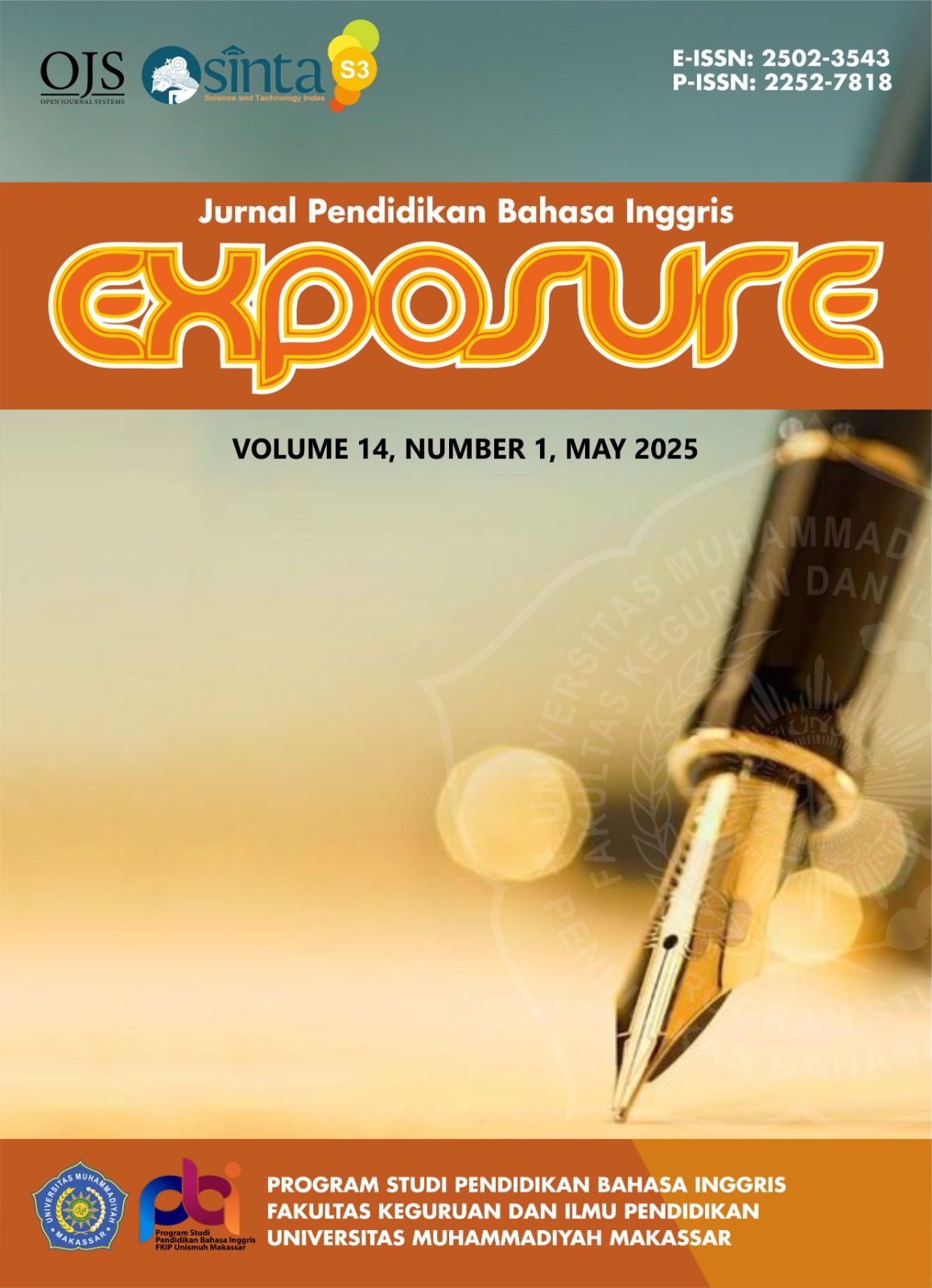THE IMPACT OF DEBATE INSTRUCTION ON THE CRITICAL THINKING AND SPEAKING SKILLS OF 21ST CENTURY EFL STUDENTS
DOI: https://doi.org/10.26618/exposure.v14i1.18357
Debate, Critical Thinking, Speaking Skills, EFL, Higher Education
Abstrak
In today’s rapidly evolving academic and technological environment, English learners are expected not only to master language skills but also to think critically and communicate effectively. However, many EFL instructional practices still focus heavily on memorization, leaving students underprepared for real-world communication demands. To address this gap, alternative teaching strategies that promote both reasoning and speaking performance are needed. This study investigates the impact of structured debate instruction on the speaking and critical thinking skills of EFL undergraduate students of Universitas Muhammadiyah Kalimantan Timur. Using a pre-experimental one-group pre-test and post-test design, 26 fourth-semester English education students participated in a five-meeting intervention. Their performances were assessed using rubrics adapted from the IELTS Speaking Band Descriptors and the Watson-Glaser Critical Thinking Appraisal framework. Data were analyzed using descriptive statistics, the Shapiro-Wilk test for normality, paired samples t-tests. The results showed significant improvement in both speaking and critical thinking skills (p < .001). Among the rubric indicators, inference and fluency showed the highest post-test scores, while deduction and grammatical accuracy showed the lowest. These findings suggest that debate can be an effective pedagogical tool for enhancing spontaneous reasoning and communicative clarity in EFL settings, while also highlighting areas that may require additional support.
Referensi
Ahmed, A. E. (2018). The impact of debate strategy on developing English vocabulary and decision making of French department students at Al-Arish Faculty of Education. Journal of Scientific Research in Education (JSRE), 19(1), 657–697. https://doi.org/10.21608/jsre.2018.7958
Basha, J. Y. (2024). The negative impacts of AI tools on students in academic and real-life performance. International Journal of Social Sciences and Commerce (IJSSC), 1(3), 1–16. https://doi.org/10.51470/IJSSC.2024.01.03.01
Bauschard, S., Coverstone, A., Rao, A., & Rao, S. (2023). Beyond algorithmic solutions: The significance of academic debate for learning assessment and skill cultivation in the AI world. Cottesmore’s Free AI Festival, 1–65. https://doi.org/10.2139/ssrn.4567346
Cranmer, G. A. (2017). One-group pretest–posttest design. In M. Allen (Ed.), The SAGE encyclopedia of communication research methods (pp. 1124–1126). SAGE Publications, Inc. https://doi.org/10.4135/9781483381411.n388
Fauzan, U. (2016). Enhancing speaking ability of EFL students through debate and peer assessment. EFL Journal, 1(1), 49–57. https://doi.org/10.21462/eflj.v1i1.8
Iman, J. N. (2017). Debate instruction in EFL classroom: Impacts on the critical thinking and speaking skill. International Journal of Instruction, 10(4), 87–108. https://doi.org/10.12973/iji.2017.1046a
Moybeka, A., Siddiqui, F., & Rahmani, Z. (2023). The impact of AI tools on critical thinking in higher education. Journal of Educational Technology, 15(2), 78–93.
Permatasari, Y. D., Nurhidayati, T., Rofiq, M. N., & Masrukhin, A. R. (2021). The task-based language teaching as method in Google Classroom application for English learning approach. IOP Conference Series: Earth and Environmental Science, 747(1), 1–7. https://doi.org/10.1088/1755-1315/747/1/012052
Pham, T. D. L. (2024). The use of debate technique to develop students’ speaking skills. HNUE Journal of Science: Educational Sciences, 69(3), 71–82. https://doi.org/10.18173/2354-1075.2024-0048
Rao, P. S. (2019). The importance of speaking skills in English classrooms. Alford Council of International English & Literature Journal (ACIELJ), 2(2), 6–13. https://www.acielj.com
Wardani, I. S., & Fiorintina, E. (2023). Building critical thinking skills of 21st century students through problem based learning model. Jurnal Pendidikan Indonesia, 12(3), 461–470. https://doi.org/10.23887/jpiundiksha.v12i3.58789
Unduhan
Diterbitkan
Cara Mengutip
Terbitan
Bagian
Lisensi
Authors who publish with this journal agree to the following terms:
In order to assure the highest standards for published articles, a peer review policy is applied. In pursue of the compliance with academic standards, all parties involved in the publishing process (the authors, the editors and the editorial board and the reviewers) agree to meet the responsibilities stated below in accordance to the Journal publication ethics and malpractice statement.
Duties of Authors:
- The author(s) warrant that the submitted article is an original work, which has not been previously published, and that they have obtained an agreement from any co-author(s) prior to the manuscript’s submission;
- The author(s) should not submit articles describing essentially the same research to more than one journal;
- The authors(s) make certain that the manuscript meets the terms of the Manuscript Submission Guideline regarding appropriate academic citation and that no copyright infringement occurs;
- The authors(s) should inform the editors about any conflict of interests and report any errors they subsequently, discover in their manuscript.
Duties of Editors and the Editorial Board:
- The editors, together with the editorial board, are responsible for deciding upon the publication or rejection of the submitted manuscripts based only on their originality, significance, and relevance to the domains of the journal;
- The editors evaluate the manuscripts compliance with academic criteria, the domains of the journal and the guidelines;
- The editors must at all times respect the confidentiality of any information pertaining to the submitted manuscripts;
- The editors assign the review of each manuscript to two reviewers chosen according to their domains of expertise. The editors must take into account any conflict of interest reported by the authors and the reviewers.
- The editors must ensure that the comments and recommendations of the reviewers are sent to the author(s) in due time and that the manuscripts are returned to the editors, who take the final decision to publish them or not.
Authors are permitted and encouraged to post online a pre-publication manuscript (but not the Publisher’s final formatted PDF version of the Work) in institutional repositories or on their Websites prior to and during the submission process, as it can lead to productive exchanges, as well as earlier and greater citation of published work (see The Effect of Open Access). Any such posting made before acceptance and publication of the Work shall be updated upon publication to include a reference to the Publisher-assigned DOI (Digital Object Identifier) and a link to the online abstract for the final published Work in the Journal.














